
Mercedes of Castile; or, The Voyage to Cathay is an 1840 historical novel by James Fenimore Cooper. The novel is set in 15th-century Europe, and follows the preparations and expedition of Christopher Columbus westward to the new world. [1]

Mercedes of Castile; or, The Voyage to Cathay is an 1840 historical novel by James Fenimore Cooper. The novel is set in 15th-century Europe, and follows the preparations and expedition of Christopher Columbus westward to the new world. [1]
A full manuscript of the novel is held at the Clifton Waller Barrett Library of American Literature in the Albert and Shirley Small Special Collections Library at the University of Virginia. [2]
The New York Review of Books reviewed the novel in 1840 and was unimpressed, saying the novel was not contributing to "any great increase of fame or fortune to Mr Cooper". [3] The review continued to describe the novel as not including much "romance", instead successfully focusing on the historical elements. [3] In 1978, critic Kennedy Williams, Jr. agreed with the assessment, noting that the novel uses history well and accurately, but is Cooper's best example of the combination of history and fiction when "fail[ing] miserably" in Cooper's novels. [4]
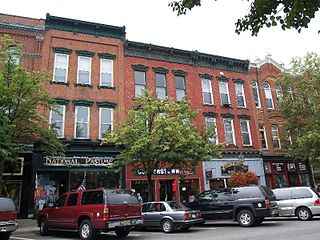
Cooperstown is a village in and the county seat of Otsego County, New York, United States. Most of the village lies within the town of Otsego, but some of the eastern part is in the town of Middlefield. Located at the foot of Otsego Lake in the Central New York Region, Cooperstown is approximately 60 miles southwest of Albany, 67 mi (108 km) southeast of Syracuse and 145 mi (233 km) northwest of New York City. The population of the village was 1,794 as of the 2020 census.

James Fenimore Cooper was an American writer of the first half of the 19th century, whose historical romances depicting colonial and indigenous characters from the 17th to the 19th centuries brought him fame and fortune. He lived much of his boyhood and the last fifteen years of life in Cooperstown, New York, which was founded by his father William Cooper on property that he owned. Cooper became a member of the Episcopal Church shortly before his death and contributed generously to it. He attended Yale University for three years, where he was a member of the Linonian Society.
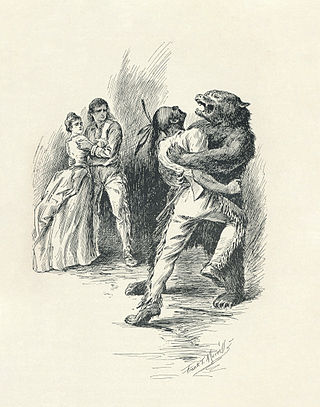
The Last of the Mohicans: A Narrative of 1757 is a historical romance novel written by James Fenimore Cooper in 1826. It is the second book of the Leatherstocking Tales pentalogy and the best known to contemporary audiences. The Pathfinder, published 14 years later in 1840, is its sequel; its prequel, The Deerslayer, was published a year after The Pathfinder. The Last of the Mohicans is set in 1757, during the French and Indian War, when France and Great Britain battled for control of North America. During this war, both the French and the British used Native American allies, but the French were particularly dependent, as they were outnumbered in the Northeast frontier areas by the British. Specifically, the events of the novel are set immediately before, during, and after the Siege of Fort William Henry.

Otsego Lake is a 4,046-acre (16.37 km2) lake located in Otsego County in the U.S. state of New York. It is the source of the Susquehanna River and largest lake in Otsego County. The Village of Cooperstown is located at the lake's southern end. Glimmerglass State Park is located on the lake's northeastern shore, and includes Hyde Hall, a large mansion constructed in 1817, that overlooks the lake. The Glimmerglass Opera, opened in June 1987, is located on the western shore.

The Leatherstocking Tales is a series of five novels by American writer James Fenimore Cooper, set in the eighteenth-century era of development in the primarily former Iroquois areas in central New York. Each novel features Natty Bumppo, a frontiersman known to European-American settlers as "Leatherstocking", "The Pathfinder", and "the trapper". Native Americans call him "Deerslayer", "La Longue Carabine", and "Hawkeye".
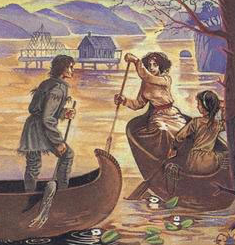
Nathaniel "Natty" Bumppo is a fictional character and the protagonist of James Fenimore Cooper's pentalogy of novels known as the Leatherstocking Tales.
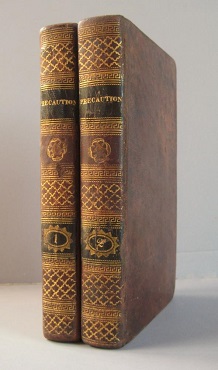
Precaution (1820) is the first novel by American author James Fenimore Cooper.
Paul Fenimore Cooper was an American writer of children's books and non-fiction, some based on his travels. His first book was a translation of Albanian folk tales.

The Monsters of Templeton is a dramatic novel written by Lauren Groff. Groff was born and raised in Cooperstown, New York. The name Templeton draws from the name devised for the town by James Fenimore Cooper, Cooperstown's most renowned author, known for The Leatherstocking Tales. Groff draws in many of the legends of Cooperstown, especially those crafted by Cooper himself, and ties them together over the expanses of time, then weaves them in with fictional modern-day events. The book was released to great critical acclaim.

Otsego Hall was a house in Cooperstown, New York, United States built by William Cooper, founder of the town. Construction started in 1796 and was completed by 1799 in the Federal style. For many years, it was the manor house of Cooper's landed estate, and was one of the largest private residences in central New York. Cooper had moved his family to the settlement in 1790, and his son James Fenimore Cooper, who became an author, also lived in the house.
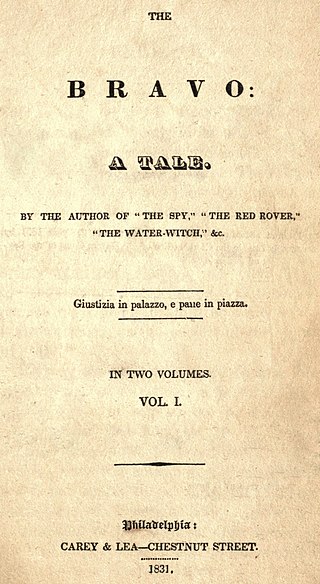
The Bravo is a novel by James Fenimore Cooper first published in 1831 in two volumes. Inspired by a trip to Europe where he traveled through much of Italy, the novel is set in Venice. The Bravo is the first of Cooper's three novels to be set in Europe. This group of three novels, which one critic would call Cooper's "European trilogy", include The Heidenmauer and The Headsman. Like his other novels set in Europe, The Bravo was not very well received in the United States. The book largely focuses on political themes, especially the tension between the social elite and other classes.
The Chainbearer; or The Littlepage Manuscripts is a novel by the American novelist James Fenimore Cooper first published in 1845. The Chainbearer is the second book in a trilogy starting with Satanstoe and ending with The Redskins. The novel focuses mainly on issues of land ownership and the displacement of American Indians as the United States moves Westward.
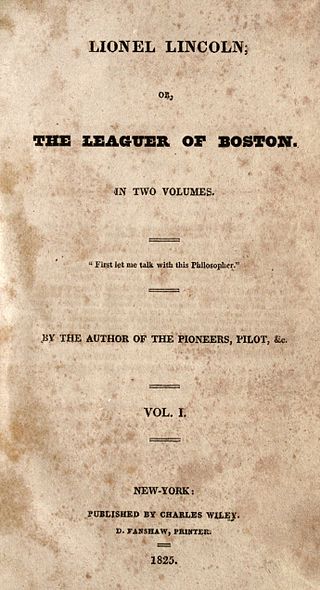
Lionel Lincoln is a historical novel by James Fenimore Cooper, first published in 1825. Set in the American Revolutionary War, the novel follows Lionel Lincoln, a Boston-born American of British noble descent who goes to England and returns a British soldier, and is forced to deal with the split loyalties in his family and friends to the American colonies and the British homeland. At the end of the novel, he returns to England with his wife Cecil, another American born cousin.
Afloat and Ashore is a nautical fiction novel by James Fenimore Cooper first published in 1844. Set in 1796–1804, the novel follows the maritime adventures of Miles Wallingford Jr., the son of wealthy New York landowners who chooses to go to sea after the death of his parents. The novel ends abruptly part way through, and is followed by what critic Harold D. Langely called a "necessary" sequel which resolves many thematic and plot elements. The novel is partially autobiographical, based in part on Cooper's own experiences as a sailor, and is his first full-length novel to fully employ a first-person narrative.
The Monikins is an 1835 novel, written by James Fenimore Cooper. The novel, a beast fable, was written between his composition of two of his more famous novels from the Leatherstocking Tales, The Prairie and The Pathfinder. The critic Christina Starobin compares the novel's plot to Jonathan Swift's Gulliver's Travels. The novel is a satire, narrated by the main character, the English Sir John Goldencalf. Goldencalf and the American captain Noah Poke travel on a series of humorous adventures to an Antarctic archipelago inhabited by a race of civilized monkeys.
Satanstoe is an 1845 novel by the early American novelist James Fenimore Cooper. The novel, sometimes listed with the alternate title The Family of Littlepage or The Littlepage Manuscripts, is the first of a three novel cycle, followed by The Chainbearer and The Redskins. The novel is a fictional autobiography which explores the 18th century colony of New York.
The Two Admirals is an 1842 nautical fiction novel by American author James Fenimore Cooper. The novel was written after the Leatherstocking Tales novel The Deerslayer. Set during the 18th century and exploring the British Royal Navy, Cooper wrote the novel out of encouragement of his English publisher, who recommended writing another sea novel. Cooper had originally intended to write a novel where ships were the main characters, though eventually decided not to. The novels is one of three novels which Cooper would revise for editions following their first printing, the other two being The Pathfinder and Deerslayer.
Wyandotté is a historical novel published by James Fenimore Cooper in 1843. The novel is set in New York state during the American Revolution. The main character of the novel is an Indian, "Saucy Nick", also called Wyandotté, whose depictions violate stereotypes of Native Americans.

The Oak Openings; or, The Bee Hunter is an 1848 novel by James Fenimore Cooper. The novel focuses on the activities of professional honey-hunter Benjamin Boden, nicknamed "Ben Buzz". The novel is set in Kalamazoo, Michigan's Oak Opening, a wooded prairie that still exists in part today, during the War of 1812.

Home as Found (1838) is a novel written by James Fenimore Cooper. It takes place in the fictional town of Templeton, which is modeled after the village of Cooperstown. In the novel the Effingham family moves back to Templeton from New York City.